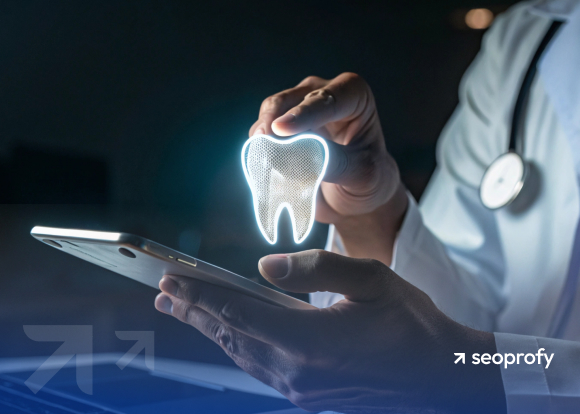SEO for dentists, or dental SEO, is a strategy to help dental clinic websites appear more prominently in online searches and attract more local patients. It involves finding appropriate keywords, creating useful content, enhancing regional visibility by optimizing Google Business Profile, and handling online reviews while making sure the site is mobile-friendly and loads efficiently.
Done right, dental SEO efforts can entirely transform how you draw patients to your clinic’s door. It ensures that you appear not only in Google search results but also on local maps, the AI Overview, and even within AI-generated answers in ChatGPT, Claude, and other artificial intelligence search assistants. In this article, we share the essential SEO tips for dentists to make this happen.
- Appearing in Google’s local search results helps you reach potential patients searching online.
- A complete, photo-rich profile with consistent details and real reviews can directly influence both your visibility and the number of bookings.
- Strong on-page dentist SEO starts with a robust tech foundation.
- Optimize not only for Google but also for the AI Overviews in Google and platforms like ChatGPT and Gemini.
General Overview of Dental SEO
Now that we’ve defined what SEO for dental websites is, let’s look at why it matters. It plays a key role in helping your clinic appear when people search for dental services like yours online, for example:
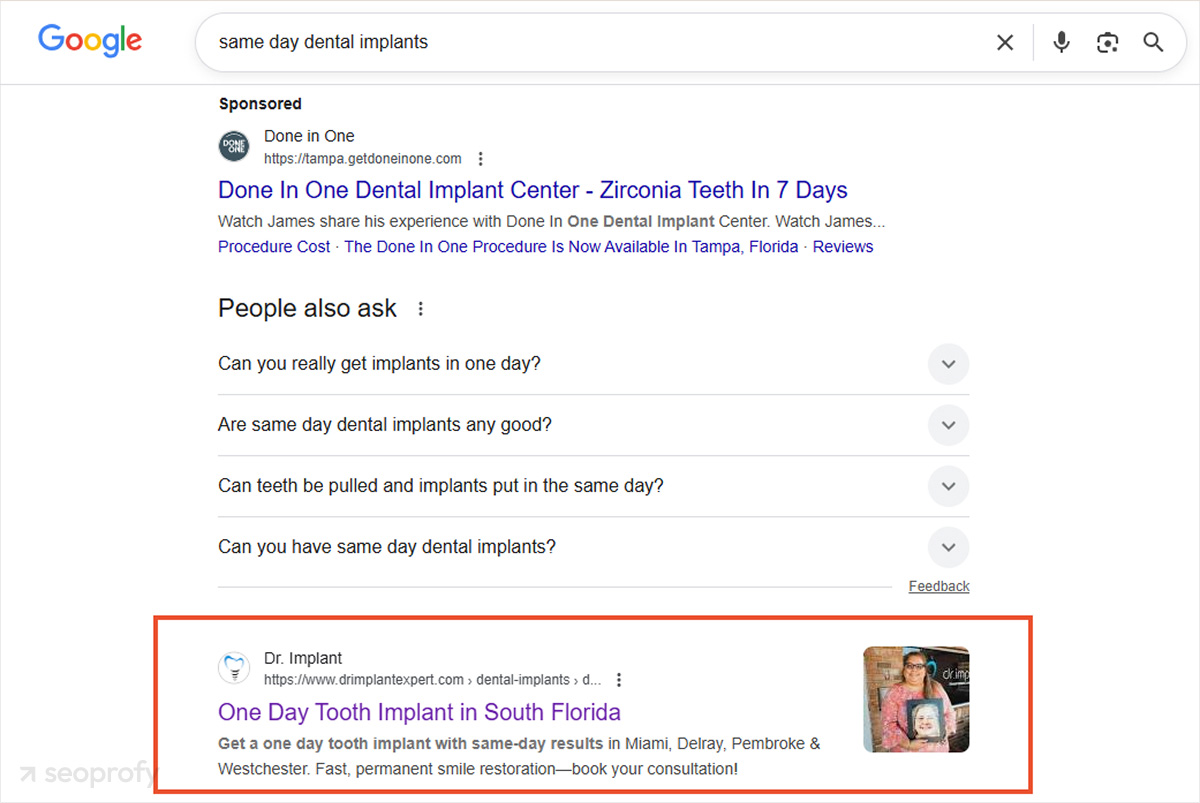
Dental practice SEO makes sure you get the right traffic that has the potential to convert. For dental clinics, the right traffic is patients nearby ready to book an appointment.
That’s why, in addition to the general dental SEO strategy, your approach should include local SEO. It lets you appear in organic listings when a person searches for “dentist near me” or “cosmetic dentistry in [your city].”
Also, local SEO for dentists gets your clinic highlighted in Google’s local pack, a map with some nearby dental offices that appears at the top of search results, often below the paid ads, or straight in Google Maps results:
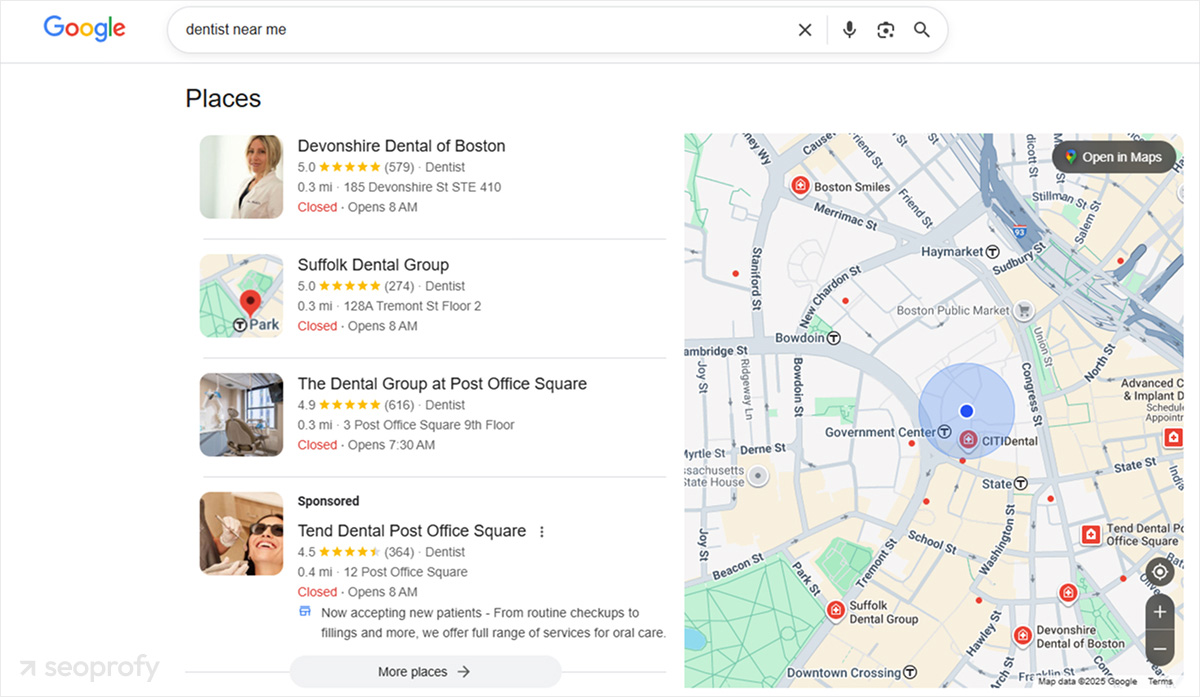
Why SEO Is Important for Dental Websites
SEO for dentists lets you reach important areas online where potential patients could be looking for a dentist. And this visibility pays off. Here’s how.
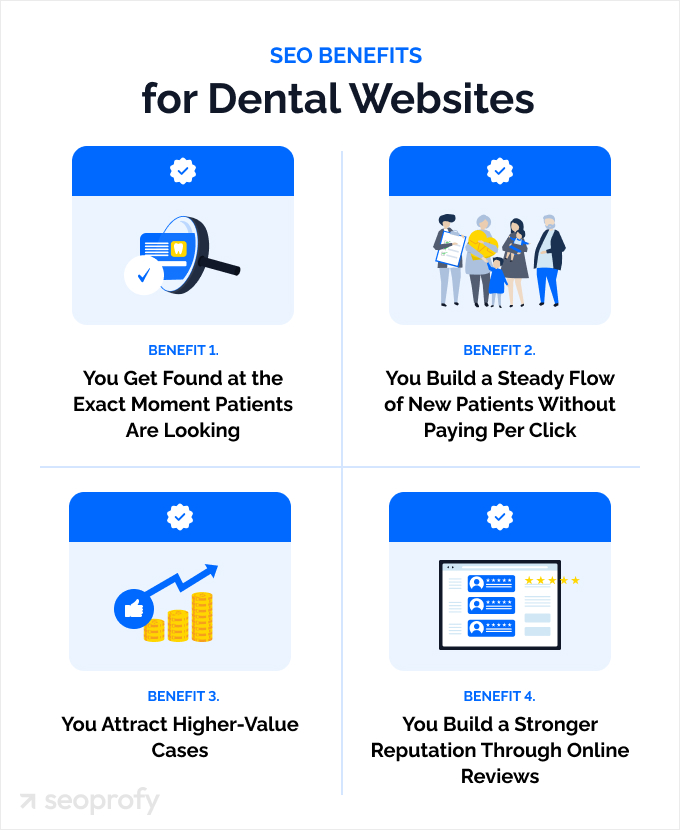
You Get Found at the Exact Moment Patients Are Looking
Only 44% of people click through to the second page of Google results. If your clinic isn’t on the first search engine results page, you’re missing out on the other 56%. That’s why being visible on page one matters most. And SEO helps put your clinic right there, in front of people, right when they’re searching for the dental services you provide.
You Build a Steady Flow of New Patients Without Paying Per Click
Paid ads can bring results, but they stop as soon as you stop paying. Search engine optimization is different; it creates lasting visibility over time. When your site becomes ranked based on the key local keywords, new patients start finding you naturally, even after the initial optimization work is complete.
You Attract Higher-Value Cases
You can choose to focus your SEO on high-value treatments like dental implants and reach patients willing to invest in this care. This helps increase your average revenue per patient.
You Build a Stronger Reputation Through Online Reviews
SEO and reputation management are closely related. Create and optimize your Google Business Profile, and your patients will be able to effortlessly leave their reviews. You’ll have a regular flow of positive feedback, and it will do both: enhance your search rankings in the local pack and build trust even before someone checks out your website.
Dental SEO Strategy: Step-by-Step Implementation
Of course, getting these benefits doesn’t happen by accident. It requires more effort than just creating a website and sharing articles about dental topics from time to time.
Search engine algorithms don’t simply assess keywords but evaluate the overall quality and trustworthiness of your entire online presence. For Google to consider your dental practice’s website as valuable for displaying to its users, you need a well-rounded SEO plan. Here’s the plan we follow at our dental SEO company to optimize every part of our clients’ online presence.
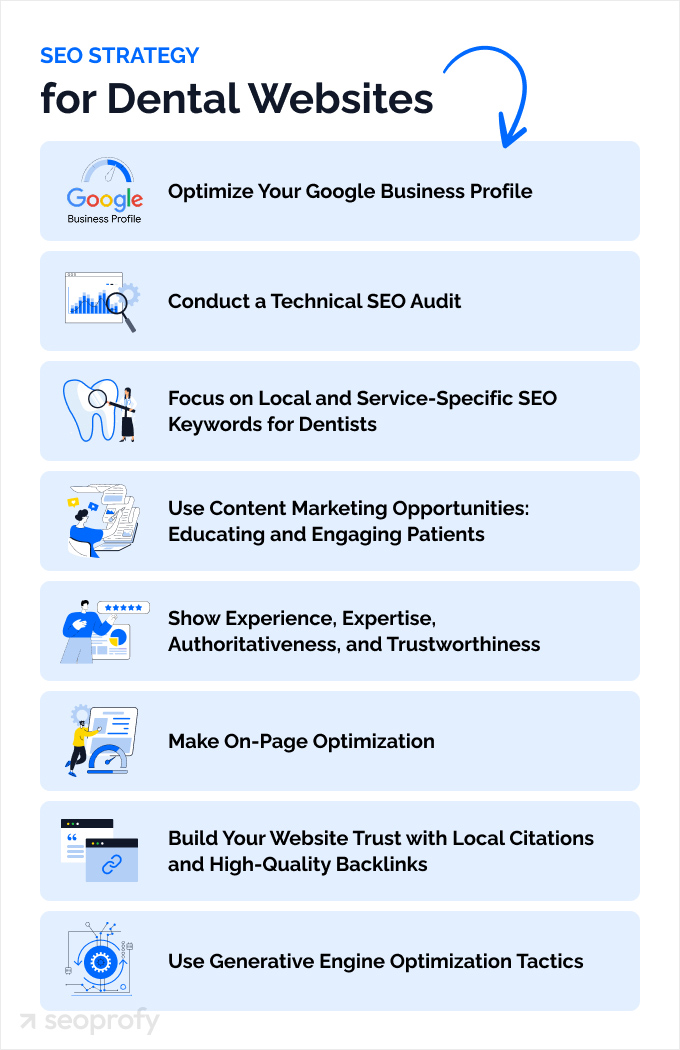
Optimize Your Google Business Profile
A Google Business Profile is a free listing for local businesses that shows up in Google Search and Maps with important business information. Optimizing this profile is crucial to your local SEO success. Here’s an example of what an expanded view of a Google Business Profile looks like:
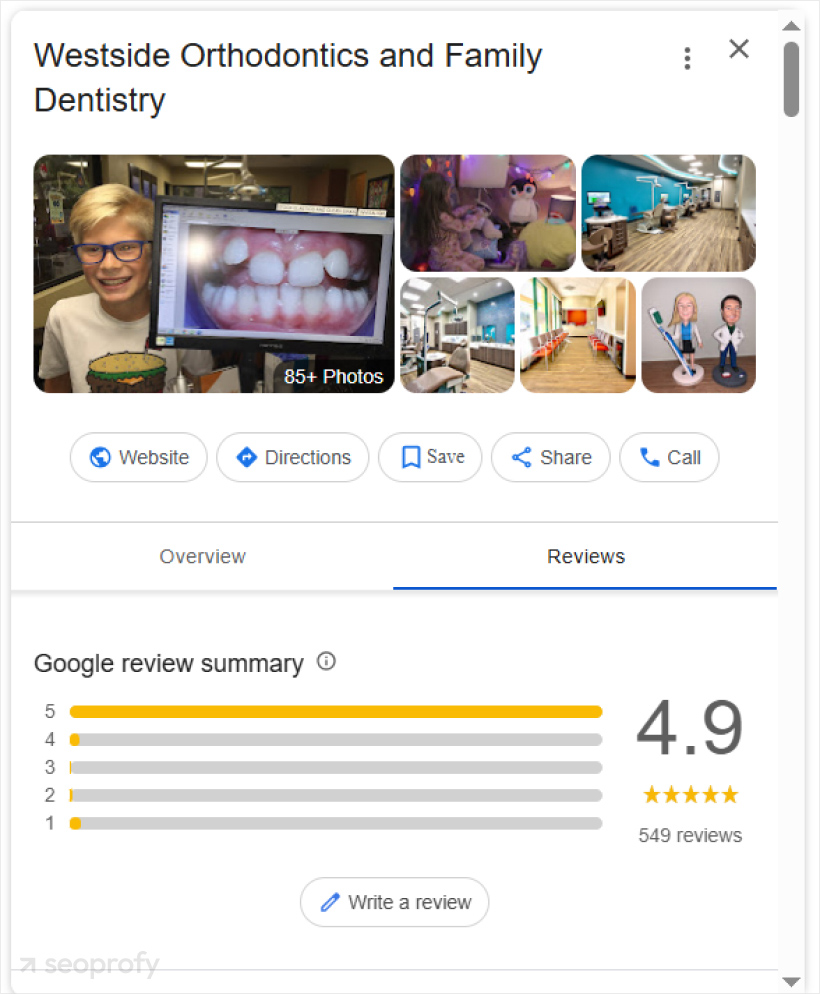
The listing consists of:
- Business name
- A carousel of images with a photo count label (85+ photos)
- Website (links directly to the clinic’s site)
- Directions (opens navigation in Google Maps)
- Call (one-tap dialing option)
- Overview with general business info, like address, phone number, working hours, etc.
- Reviews with the patient feedback and rating
According to SEO statistics, if your listing is complete, there are 70% more chances that people will visit you. Below are some core tips to help you make the most of your profile and strengthen your local SEO efforts:
- Keep your information consistent: Google relies on accurate business data across the web. If details like your clinic’s name, address, and phone number are different across your website, social media, and online directories, this can negatively affect your local search engine optimization.
- Add real photos: Photos of your clinic’s exterior, interior, and the team make your profile seem more authentic and allow future patients to imagine what it would be like to come to your practice. This helps them feel more comfortable and confident about choosing your clinic.
- Collect and respond to reviews: Encourage happy patients to share their feedback and respond thoughtfully each time someone leaves a review. This helps you build trustworthiness and promote your SEO for dentists. Additionally, when patients mention specific treatments in their feedback, this provides Google with additional details that can help link your clinic with comparable search inquiries:
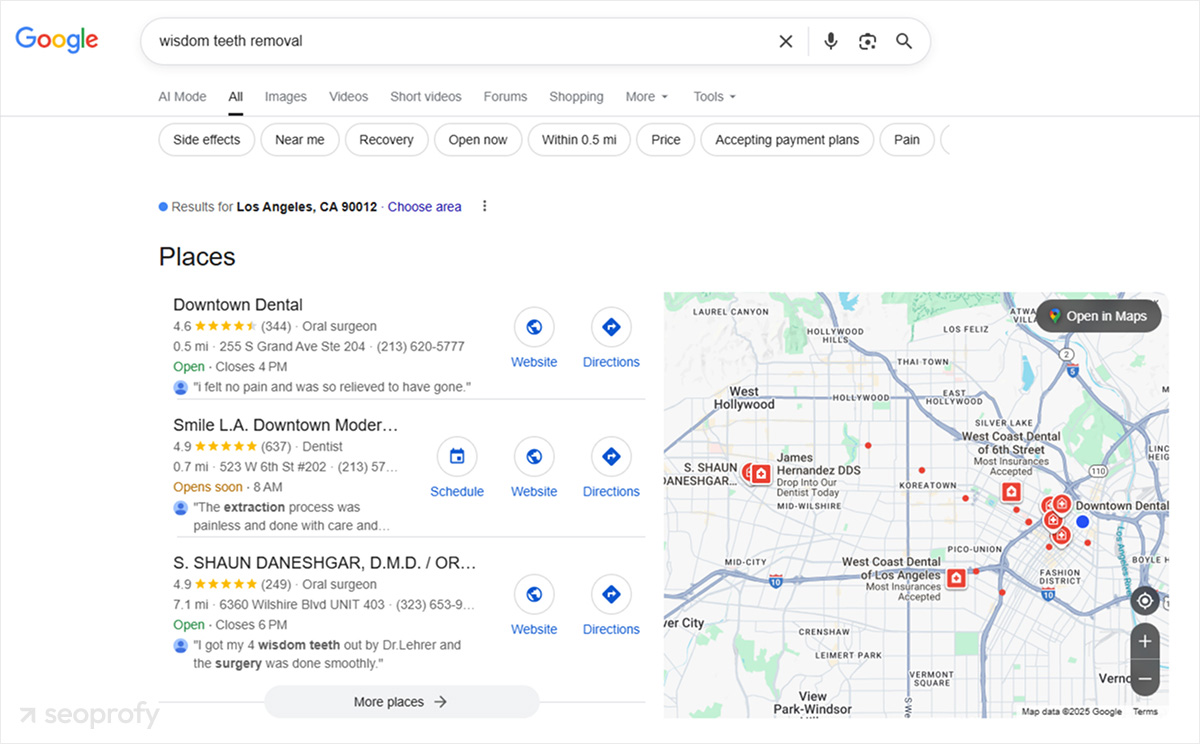
With our local SEO services, you’ll ensure your Google Business Profile is fully optimized and drives real patient inquiries.
Conduct a Technical SEO Audit
When it comes to SEO for dentists, technical SEO typically comes first. Without a solid tech foundation, content improvements won’t make a lasting impact. To figure out if your site has any technical gaps that could affect both visibility and user experience, perform a thorough dentist SEO audit with attention to the following areas.
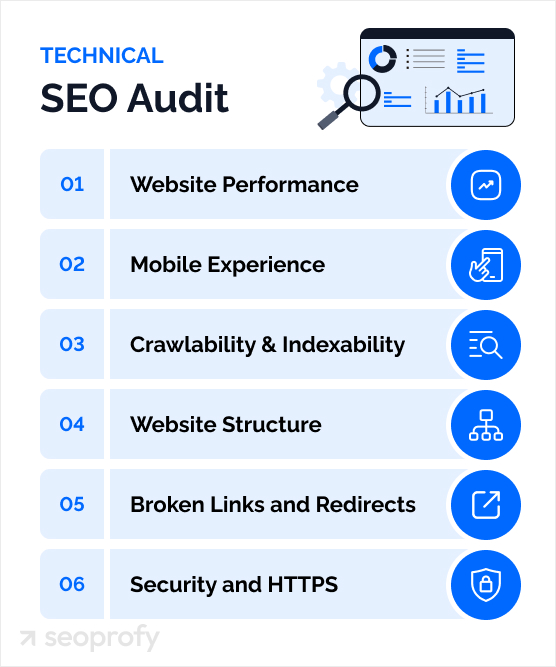
Website Performance
Google measures website performance with Core Web Vitals (loading speed, interactivity, and visual stability). You can check it by using tools like Google PageSpeed Insights. It reveals what slows down your site, like oversized images, heavy code, or server issues, and provides suggestions to enhance the performance.
Mobile Experience
Your website must work well on every screen size, not only desktop, but also tablet and phone. To test your mobile experience, you can open your site using mobile devices to see if everything is fitting properly, loading in the right way, and is simple to read. In addition, you could try the Mobile-Friendly Test tool from SE Ranking to find out whether any problems related to usability are found by the search engine.
Crawlability & Indexability
Search engines need permission and clear paths to reach your pages. Unintentional “noindex” tags (when pages that are meant to be indexed are mistakenly marked with this tag) or constant redirects (loops preventing crawlers from reaching the end page) can hide essential content.
To verify your pages can be crawled and indexed, you can use Google Search Console. There, you’ll see which URLs are included in Google’s index and which are excluded (not indexed), and the reasons behind it.
Website Structure
Your website must have a straightforward structure. Imagine you’re a first-time visitor to your website, trying to navigate it. Can you access the primary services and contact page with just one or two clicks? You may also use a basic crawl tool like Screaming Frog SEO Spider to check the structure of your site and identify which pages could be difficult for Google to access.
Broken Links and Redirects
Over time, some web addresses (URLs) can change or some pages can be removed, which may result in broken or old links. These mistakes make both the user experience and crawl efficiency worse. That’s why you should also remember to look for damaged internal and external links to keep a continuous route through the website. You can use SEO tools like Screaming Frog, Ahrefs, or Semrush to identify and fix these issues.
Security and HTTPS
A secure website is also critical for the trust of patients and visibility in search results. Web browsers show warnings if a site doesn’t use HTTPS, which can make users think twice before giving their personal information on such websites. By quickly checking the site address and how it’s hosted, you can verify if the connection is safely encrypted.
Focus on Local and Service-Specific SEO Keywords for Dentists
Once your website has a solid technical base, it’s time to focus on what actually connects you with patients — the words they type into Google. Every keyword reflects a specific search intent:
- Informational: The user wants to learn or find an answer: “Is teeth whitening safe?”
- Navigational: The user wants to reach a specific site or page: “Colgate professional site.”
- Commercial (investigational): The user is comparing options before deciding what to purchase: “best pediatric dentist in [city].”
- Transactional: The user intends to complete an action (book an appointment): “get an Invisalign consultation in [city].”
Google Keyword Planner and Ahrefs can show you what people in your location are searching for and the frequency of these searches. This data lets you select phrases that can attract the right website visitors. Some SEO tools also allow you to search for keywords based on a specific intent:
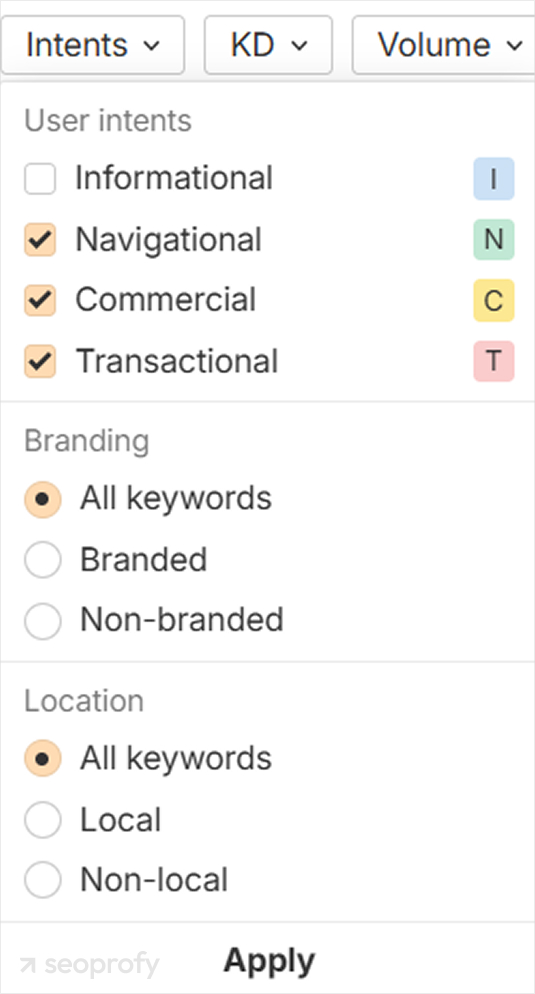
When it comes to SEO for dentists, the most valuable keywords are the ones that combine your service with its location. These, often long-tail keywords, are usually used by people who are ready to book. You can begin by considering the primary treatments you want to advertise. Then, pair each one with your location.
Use Content Marketing Opportunities: Educating and Engaging Patients
After discovering the relevant keywords your target market uses, you should include them in your website content. But what exactly should you write about?
Create Service Pages
Most of the long-tail keywords you’ve discovered reflect commercial and transactional intent. Your service pages are the best place to use these keywords.
Each treatment you provide should have a page devoted solely to it, which plainly describes what the service is about, who can benefit from it, and why choosing your clinic would be a wise decision. If your clinic is available in multiple areas, it can be useful to make different web pages with the same service for every location.
Write Targeted Blog Content
Bog posts attract those people who need information in the first place — they’re looking for answers and not a clinic yet.
Even if blog content might not immediately draw in people who are ready to make an appointment, it has a long-term effect — nurturing future patients. You plant a seed by providing initial help or demonstrating your expertise, so that when they eventually require dental services, they may remember your clinic.
As shown in the screenshot below, the article “Achieve a Taylor Swift Smile with Dental Veneers?” is an excellent example of an article with informational intent. People who search for this aren’t yet scheduling a consultation; they just want to know how famous people get perfect smiles and what procedures may be needed.
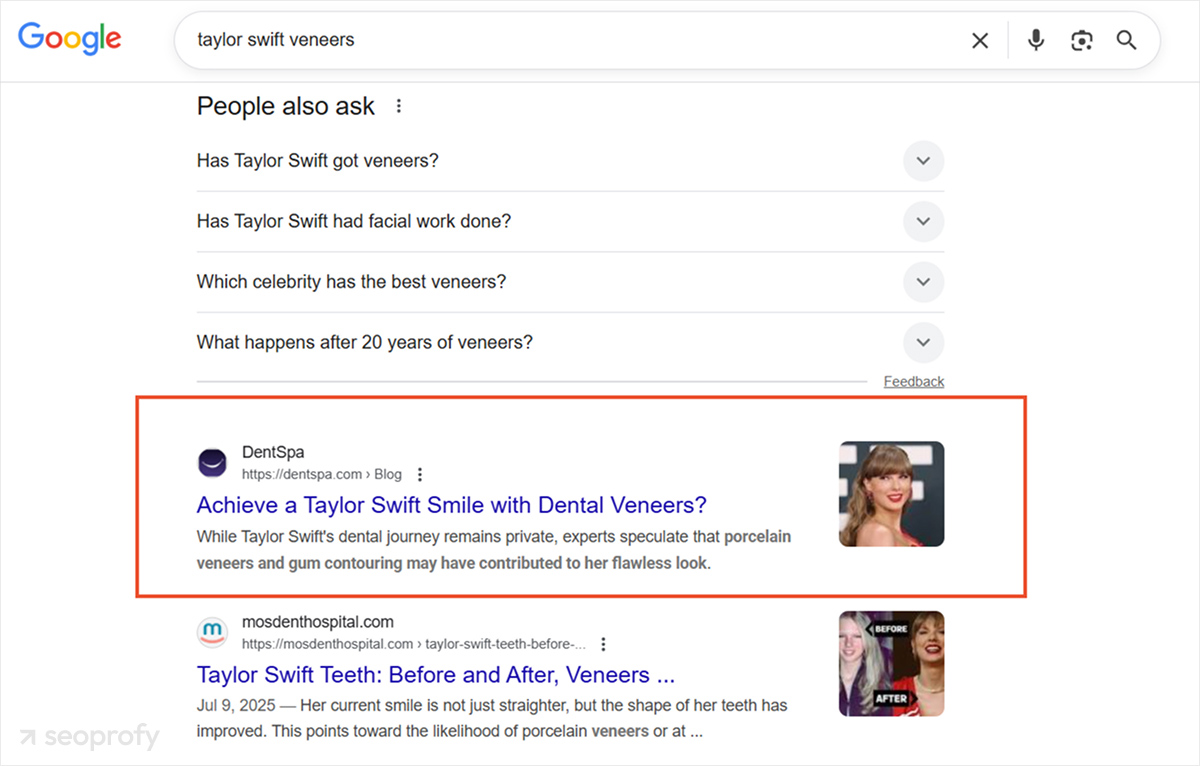
Additionally, the keyword “Taylor Swift veneers” is simple to rank for, as it has a difficulty score of 0 and search volume of about 7.6K. This indicates that not many websites are competing using this keyword, but every month, there are plenty of people searching for it.
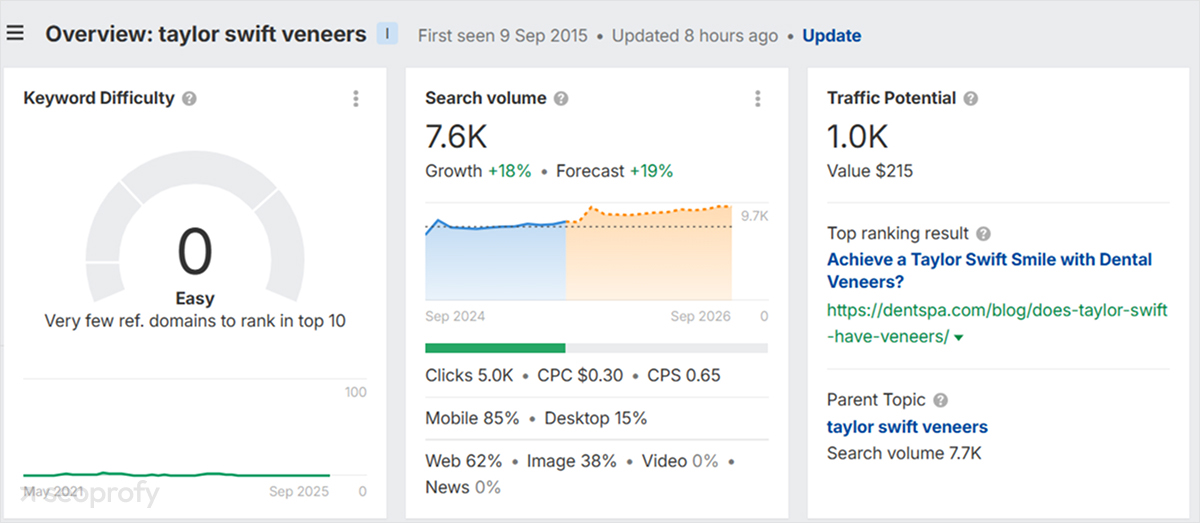
On top of that, Google prioritizes content that provides helpful, reliable information and shows expertise. It defines this factor through the concept of E-E-A-T.
Show Experience, Expertise, Authoritativeness, and Trustworthiness
E-E-A-T matters for every dental marketing strategy, but it’s especially important for Your Money or Your Life (YMYL) topics — those that can directly affect someone’s health, safety, or finances. The dental industry falls into this category.
Here’s what each E-E-A-T part means in SEO for dentists:
- Experience is about demonstrating that you actually have experience in what you’re writing about. You might share real examples from your dental practice, like before-and-after results (with consent).
- Expertise reflects your professional knowledge. You can mention your specific expertise in the author section of an article to indicate that your content isn’t generic but has an expert contribution. A page About Our Team, similar to the example below, which includes your dentists’ names and qualifications, could also work in your favor.
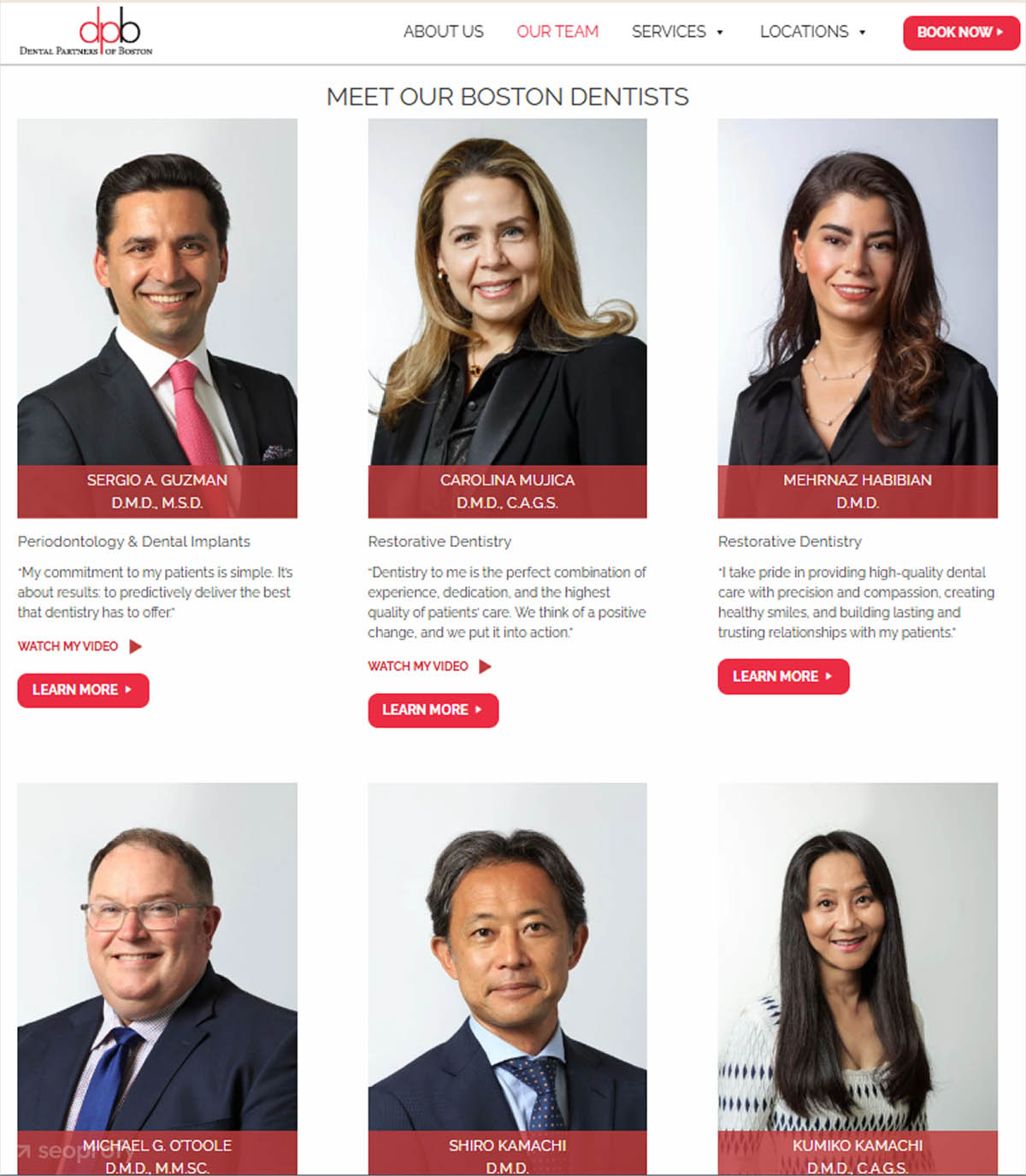
- Authoritativeness grows when others recognize you as a trusted source. That could be local directories linking to your clinic or your guest articles on reputable health sites.
- Trustworthiness ties everything together. It means having accurate contact details, honest reviews, up-to-date information, and a secure website. Dental patients must feel secure when they share their details and be sure that information on your website is accurate.
If you regularly provide this type of content, both people and Google will recognize your dental clinic for what it truly is: a place with experience and professionalism.
Make On-Page Optimization
Once your keywords and content are ready, it’s time to put them together. On-page optimization is about helping Google understand what each page is about and making sure your visitors can easily find what they need. Here are the main steps for on-page optimization that our dental SEO experts follow at SeoProfy.
Start with Your Titles, Subheadings, and Body Text
Every page must have a single clear, descriptive title and several subheadings that contain your main keyword. In the text, you should use your keywords in a natural way to avoid keyword stuffing. This can negatively impact your search engine rankings and make your content look robotic.
Craft Meta Titles and Descriptions
The meta title is the main heading that appears in Google search results; the meta description is the small text below it. The good meta title must have your primary keyword and clinic name, while the description should shortly describe what this page provides and motivate people to click on it.
Add Schema Markup
Schema markup is a small bit of code that you should add to each page in terms of your SEO for dentists. It helps search engines grasp your content more clearly. If it’s a dental clinic, this could have details, such as your address, contact number, and working hours.
Schema can assist in making your pages appear with additional information in search results, like star reviews or links for scheduling appointments, which makes your listing catch attention and seem more reliable.
Drive consistent website traffic and bookings with data-backed SEO strategies designed for clinics like yours:
- Smart keyword targeting
- Organic traffic growth
- Clear, honest results

Build Your Website Trust with Local Citations and High-Quality Backlinks
Earlier, we talked about Authoritativeness. One of the main ways to build it is through a strong backlink profile and consistent local citations.
Backlinks are references from other websites that link to your dental website. When trustworthy sites, particularly those related to health, dentistry, or your local community, connect to you, Google sees them as evidence that your website provides value.
Additionally, local citations are important for a dental SEO strategy for similar reasons. These are the mentions of your clinic’s name, address, and phone number on platforms, such as Yelp. If someone is looking for the best orthodontists, they may come across a Yelp listing like the one shown below, which highlights top-rated clinics in their area, and find your practice there.

You don’t require many backlinks or local listings to make an impact, as quality outweighs quantity in SEO for dentists. A smaller number of references from trustworthy, related sources will benefit your clinic much more than numerous ones from irrelevant websites. With our link building services, you’ll ensure your clinic earns mentions from reputable sources.
Use Generative Engine Optimization Tactics
You’ve probably already noticed AI-generated overviews appearing at the top of Google results. These overviews take details from a variety of sources to give fast responses, and they frequently add direct links to the websites they rely on.
On top of that, now people can directly inquire AI assistants with questions, such as “best dentist close to me” or “what is the cost of Invisalign in [city]?”, and they will receive a brief answer immediately. It often includes names of local clinics.
This is the reason your clinic must be visible not only in Google’s search results, but also within these AI-generated responses. This is where generative engine optimization (GEO), or SEO for LLMs, comes into play and complements SEO for dental offices. It’s about helping AI systems understand and trust your content to showcase it in AI-generated results.
Here are some suggestions for making your site more visible to AI bots:
- Keep your website crawlable: AI platforms collect information from the internet, so it’s vital to ensure that your pages are accessible to crawlers, such as Googlebot and GPTBot.
- Use clear headings, short paragraphs, and bullet points: AI systems like structure and easy-to-follow instructions. A well-structured page helps them quickly get the correct information. AI may even use quotes from your answers directly.
- Share original and first-hand insights: This brings us right back to E-E-A-T. Share authentic stories, expert opinions from your dentists, and examples from your day-to-day work. AI tools already have knowledge of all the common information on the internet. What they now appreciate more is something special — your genuine experience.
- Diversify your content formats: Publishing across blogs, videos, social posts, and Q&A sites to give AI models more ways to find and reference your business in different contexts.
- Track brand mentions in AI results: Monitor how often and where your brand appears in AI-generated answers. Tools like Semrush AI Toolkit or Ahrefs Brand Radar show which pages AI models reference, helping you identify when your visibility drops and decide which content needs updates.
As SEO for dentists is a multidisciplinary field, all the tactics listed above must work together to make your clinic visible, both in organic search results and across AI-powered search assistants. Applying them all can be challenging, particularly if your primary focus is patient care. While your doctors may provide important knowledge for your upcoming blog post, it usually requires an SEO expert to achieve a meaningful ROI.
How Much Do Dental Search Engine Optimization Services Cost?
At this stage, a natural question comes: how much does dental website SEO actually cost?
The SEO campaign cost is based on factors such as the level of competition in your area, how many services and locations you want to target, and how established your website already is. To provide you with an approximate estimate, here’s what clinics typically invest in SEO for dentists:
- Small local clinics: around $1,500–$3,500 per month
- Mid-sized or multi-location practices: around $4,000–$7,000 per month
- Larger dental networks or highly competitive markets: $10,000+ per month
These numbers usually cover the full package of local dental SEO services: technical audit, keyword research, SEO copywriting services, link building, ongoing reporting, etc. Certainly, such an investment should give returns, and with the correct approach to SEO, it will happen.
Dental SEO Strategy that Works
Our SEO agency assists dentists not only in reaching top positions in Google, but also in growing patient inquiries and bookings. In our SEO cases, we constantly report on the recent successes in improving our clients’ results.
If you’re ready to turn your website into a stable source of new dental patients, let’s talk. Our dental SEO marketing team will assess your current online performance, identify missed opportunities, and create a clear path to steady growth.
Require professional dental SEO specialists to improve your online visibility? Schedule a free consultation with our search engine marketing team and discover what your clinic could achieve with a proven dental SEO strategy!

